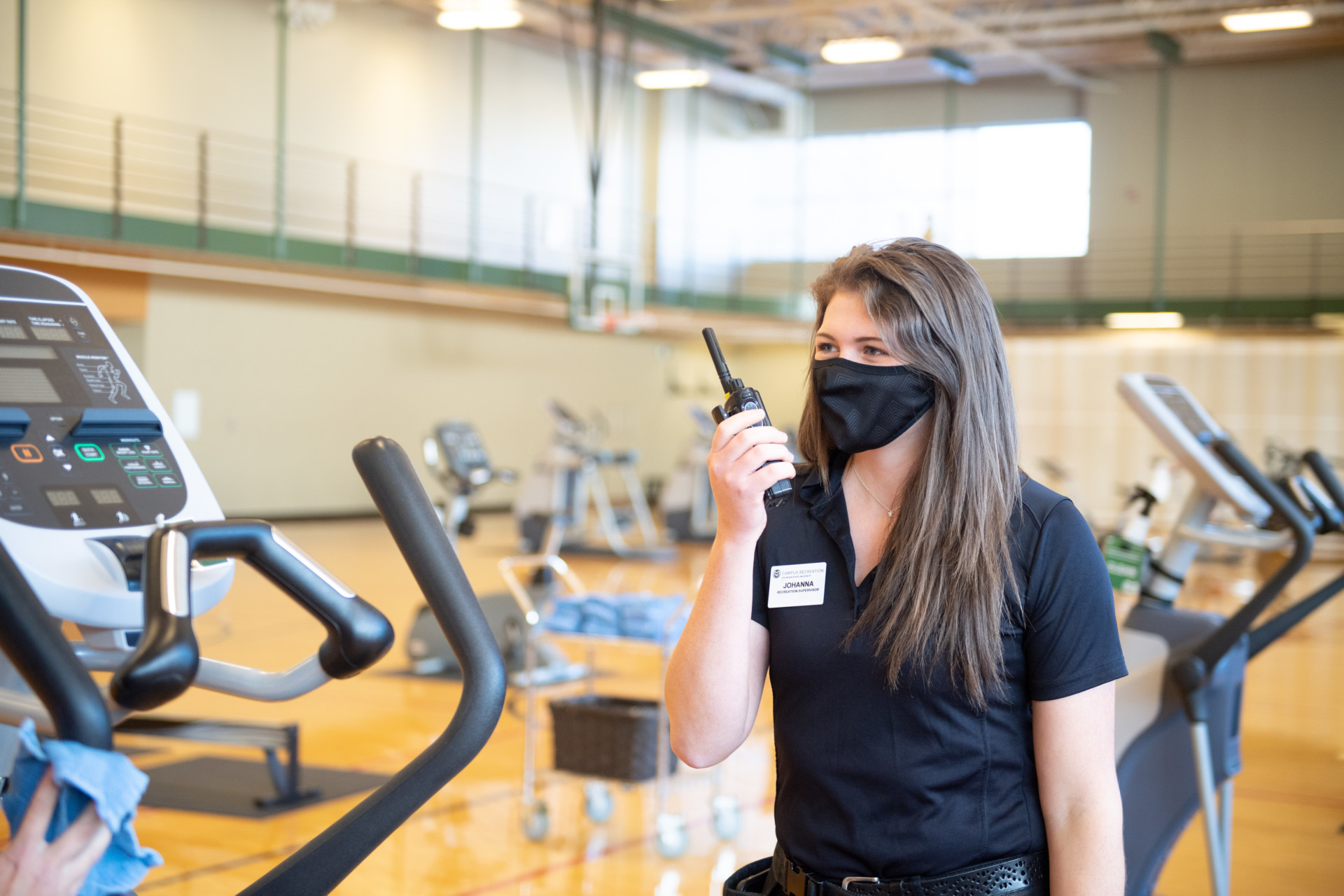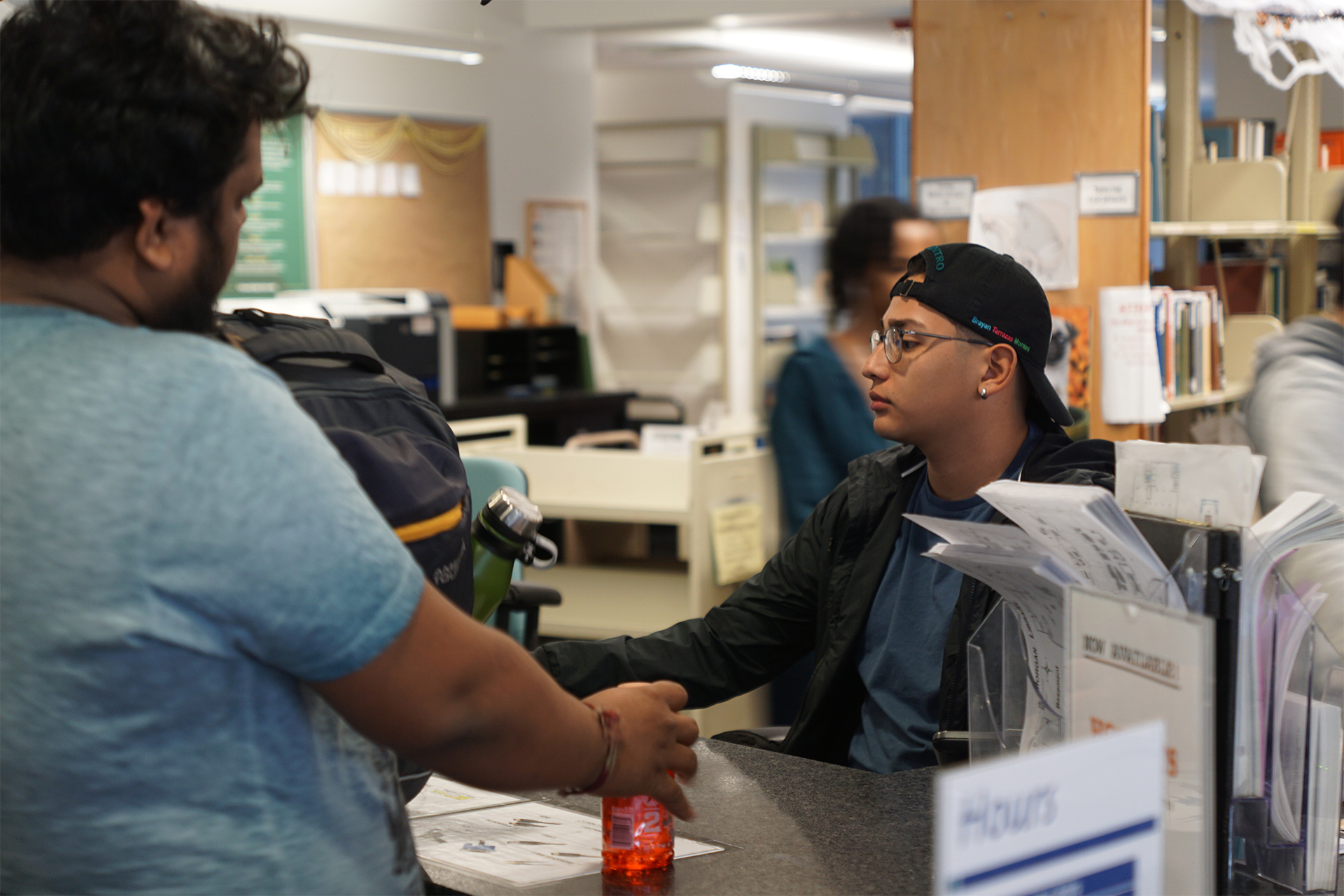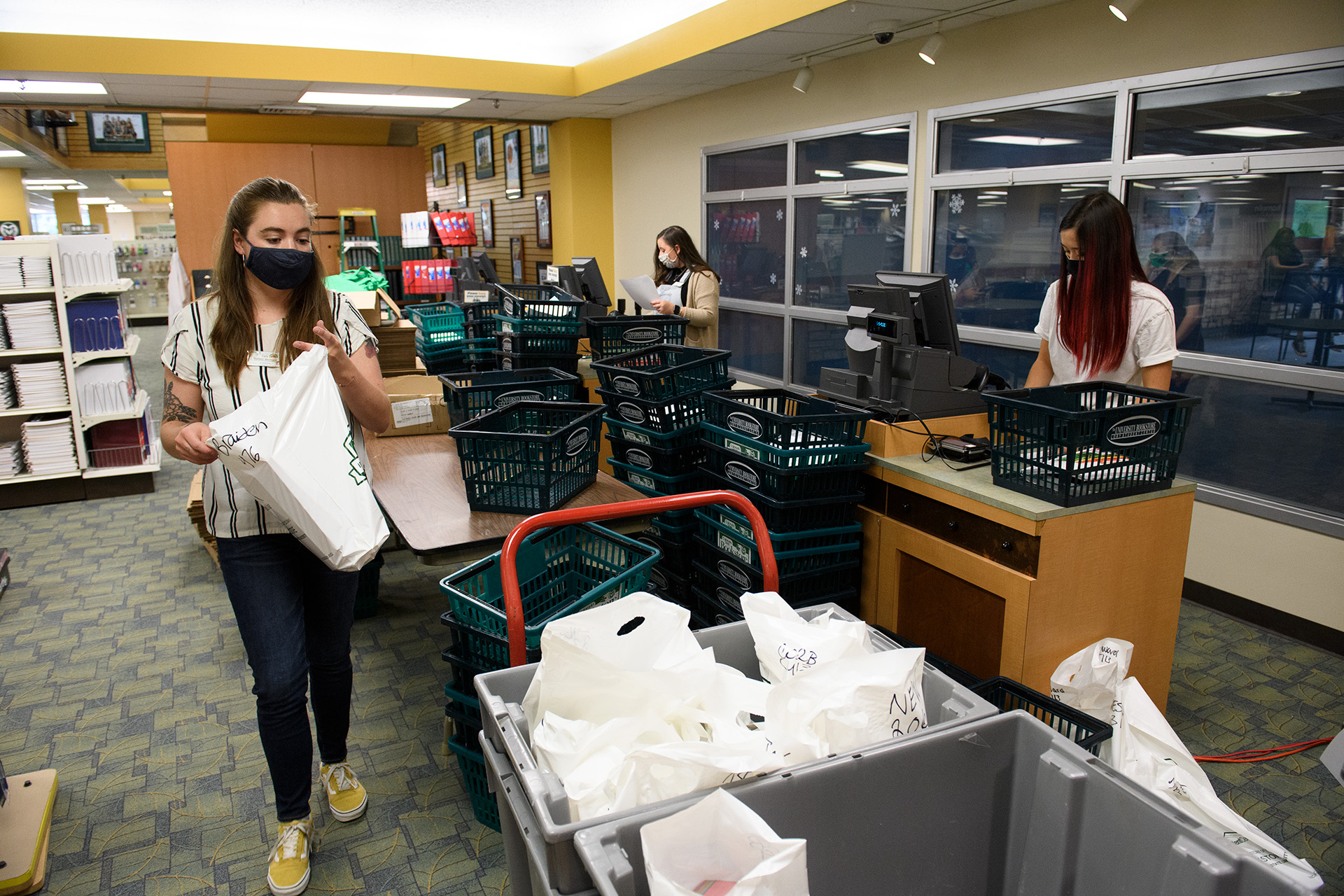On-campus employment
A driver of student success story by Joe Giordano published Nov. 10, 2020Photo by William A. Cotton/CSU Photos
For senior Johanna Michelsohn, Colorado State University’s Student Recreation Center has been a fountainhead of many memorable college experiences.
Michelsohn, who serves as a recreation supervisor overseeing day-to-day building operations, said she met some of her best friends and roommates at the Rec and gained professional development skills that will help her when she one day becomes a pediatrician. It’s also been an important resource in helping her pursue her college education.
“I have to pay for a lot of my expenses, so it would definitely hurt if I didn’t have this job,” she said. “It has been financially very helpful.”
Michelsohn is one of more than 4,000 current CSU students who take advantage of campus employment — something university administrators say is a potent ingredient in helping students foster community, sharpen professional skills and graduate from college.
According to a recent university report, working on campus is positively associated with persistence and graduation across all years that students are employed, compared to students who did not work during the same time period. The CSU report was produced by Institutional Research, Planning and Effectiveness, an office that supports strategic planning and institutional improvements.
Sarah Roeder, associate director of campus employment and employer connections at CSU’s Career Center, said this is especially true for students with multiple underrepresented identities.
“Having a job on campus is one more tie to the CSU community,” she said. “They’re gaining those additional benefits of career competencies that you might not always find in the classroom.”
Developing professional skills

CSU senior Johanna Michelsohn working at the Student Recreation Center. Photo by William A. Cotton/CSU Photos
Provost and Executive Vice President Mary Pedersen brought an idea to the Teaching Continuity Recovery Team, chaired by Kelly Long, vice provost for undergraduate affairs, which resulted in an initiative to employ students to assist faculty in remote course delivery.
Long explained CSU has dedicated resources to campus employment as part of this initiative, and students have supported teaching continuity by helping with technology, managing chats, breakout groups and other aspects of remote or hybrid courses.
The provost “recognized the importance of student employment and how it could help us in our educational mission, while also helping students,” Long said.
According to Roeder, on-campus employment helps students enhance career competencies such as the ability to successfully work on teams as well as the sharpening of organizational communication skills.
At the Student Recreation Center, Michelsohn said they work on professional development in staff trainings that go beyond customer service and building maintenance. She said she has received job interview advice that has helped with her medical school interviews.
“I felt more confident because I had interview practice at the rec center and strengths coaching,” she said.
Long explained that students taking advantage of campus employment are applying key skills such as collaboration, communication, creative and critical thinking and problem solving, among others, all of which are key learning outcomes of CSU’s All University Core Curriculum.
“One of the precepts in education is that you learn when you teach others,” Long said. “On-campus employment is often an opportunity for students to be in roles where they are actually deepening their learning. Even if they’re not working in a classroom, they are applying the learning outcomes that are central to our core curriculum.”


Pre-pandemic photos: Students work at the Loan Desk and the Help Desk at Morgan Library.
CSU Libraries is another significant campus employer, with nearly 100 student workers. There, students get valuable experience in library operations as well as customer service and research skills through meaningful employment.
According to leadership at CSU Libraries, campus employment helps sharpen problem-solving skills as well as create a sense of belonging for students.
Justin Malone, a junior who works at the Help Desk, emphasized the importance of developing relationships with users.
“It’s a lot of interpersonal skills, such as conflict management,” he said in a recent issue of the Libraries’ magazine, Stay Connected. “Usually you see the same people, and it’s about growing relationships with those people. After 5 p.m., there’s a lot of community patrons, and they each have their different reasons for why they’re there.”
‘Stay Connected’
Learn more on how student workers at Morgan Library are gaining valuable experience and helping the university community by reading Stay Connected magazine. read more
Ryan Barone, assistant vice president for Student Success, explained that facilitating student connections to meaningful work, while at CSU and after, is a hallmark activity of the CSU Career Center.
“As a low-income first generation college student, my work study jobs were essential to completing college,” he said. “The vision of the Career Center Student Employment Unit — to make every student employment position a meaningful high impact experience that drives toward career and educational goals — is a priority as we move forward the university student success initiatives.”
Building community

Students work at the Bookstore at the start of the Fall 2020 semester. Photo by John Eisele/CSU Photos
Like Barone, Roeder understands the lasting impact of campus employment.
Long before working at the Career Center, she was a CSU campus employee in dining at Corbett Hall and later a student assistant for a professor in the School of Education.
“Because I was working for a professor in the School of Education, I was slowly learning that I valued continuing education,” Roeder said.
The memories of her experiences at CSU eventually brought her back to her alma mater to work at the Career Center.
Two years ago, Roeder was promoted into her current role after some elements of campus employment moved from the Office of Financial Aid to the Career Center as a way for students in order to promote student success initiatives, increase bandwidth to promote student development and ensure campus work is an essential part of the overall college experience.

Michelsohn works with fellow student staff member Addy Morris at the Student Recreation Center. Photo by William A. Cotton/CSU Photos
Roeder said the Career Center now has more than 80 resources on its website to help students and student supervisors navigate campus employment, ranging from job searching to hiring and retention. She added that the Career Center also has a student supervisor training program, Elevate Student Supervision, through which supervisors can earn a certificate in student supervision while developing leadership and coaching skills.
“In the past two years, the Career Center has really helped students and our on-campus partners understand that part-time work is part of the overall career journey,” she said. “It’s a place where students start to find out their career interests.”
Michelson agrees, based on her experiences at the Student Recreation Center. The job has helped her sharpened key interpersonal communication skills, and she developed an invaluable network of friends and professional references that will help her the rest of her life.
“When I look back at CSU 30 years from now, the rec center is going to be one of the most memorable things,” she said. “Without it, I’d be missing this huge community aspect of college. It’s like I have this family, which is wonderful.”
Jenna Allen contributed to this story.